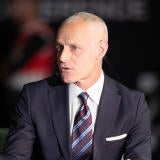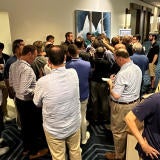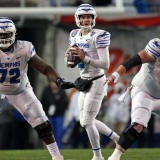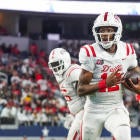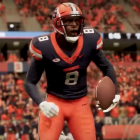More: O'Bannon news | On CFB: Dennis Dodd | Jeremy Fowler | Jon Solomon
Fourteen current and former college athletes filed their consolidated class-action complaint Friday against the NCAA and 11 Division I conferences, alleging they illegally cap football and basketball scholarships “substantially” below players’ value in a competitive market and the cost to attend school.
The case is the next major antitrust threat for the NCAA, which is awaiting a ruling from last month’s Ed O’Bannon trial over the use of players’ names, images and likenesses. The 168-page amended complaint alleges the NCAA and its conferences unlawfully restrain trade in the market for Division I football players, Division I men’s basketball players and Division I women’s basketball players.
The Shawne Alston, Shariff Floyd, Nick Kindler, Kendall Gregory-McGhee and Alex Lauricella plaintiffs were grouped together last month. They seek to represent all football, men’s basketball and women’s basketball players in Division I who received a scholarship since March 5, 2010. They particularly are going after the five major conferences -- the SEC, ACC, Big 12, Pac-12 and Big Ten.
The Martin Jenkins lawsuit that aggressively seeks a free market for athletes when they're recruited, brought by prominent sports attorney Jeffrey Kessler, is not part of the consolidated complaint. Kessler was allowed to proceed in the Northern District of California separately but after the other plaintiffs, Alston attorney Steve Berman said.
The amended complaint in some ways crystalized the direction of the case. It argues that if not for the cap on scholarship values, players would not only receive an increase but “every player likely would receive further additional compensation above the Cost of Attendance."
The plaintiffs want an injunction that prevents the NCAA and the conferences from maintaining its financial-aid limits and damages for the difference between scholarships awarded and the cost of attendance. The cost-of-attendance gap for a full scholarship Football Bowl Subdivision player ranged from $1,000 to $6,904 a year, according to a 2012 study.
The amended complaint includes two current athletes as named plaintiffs: Arkansas State defensive end Chris Stone and North Florida men’s basketball player Chris Davenport. Three former women’s basketball players are in the complaint, raising the possibility that Title IX will become a factor in this case, unlike in the O’Bannon lawsuit. Floyd, a former Florida football player now on the Minnesota Vikings, is the most high-profile plaintiff.
The NCAA, which unsuccessfully tried to pass a cost-of-attendance stipend in 2011, votes next month to give Division I major conferences authority to provide more benefits to players, such as the full cost of attendance. The language from the pending O’Bannon ruling by U.S. District Judge Claudia Wilken could significantly impact the scholarship litigation she also oversees.
The NCAA declined to comment about the amended scholarship complaint.
Plaintiffs: Let conferences set values
The plaintiffs said “numerous” less-restrictive alternatives are available to the current NCAA scholarship rules, such as allowing conferences to independently compete against each other over scholarship terms. If the conferences did not act as a “narrower cartel,” each conference would raise the scholarship cap above the current levels, the plaintiffs wrote.
“If each conference were to determine (in its own independent determination) that by offering its athletes more than the Cost of Attendance, it would lose fan interest and thus suffer a decline in revenue, nothing in an open market would compel them to make such a business-losing payment offer,” the lawsuit said. “However, were the individual conferences to collude before making that determination (as has been proposed in recent NCAA proposals), this would constitute a continued violation of the antitrust laws."
The plaintiffs said they want a court-appointed antitrust compliance monitor due to the current conduct by the five major conferences, such as “price-fix signaling” in a letter from Pac-12 presidents to other conferences in May to pass NCAA autonomy.
Rising salaries for coaches were mentioned in the complaint, including Alabama football coach Nick Saban’s recent raise to nearly $7 million per year. The lawsuit noted Saban’s $1.5 million raise by itself would amount to about $17,000 per scholarship football player at Alabama.
In perhaps a first for college sports litigation, salaries of women’s basketball coaches were discussed. The complaint noted that Connecticut women’s basketball coach Geno Auriemma recently signed a $10.86 million contract that, with bonuses, could allow him to eclipse $3.5 million in the final year.
Information from the recent Northwestern unionization case before the National Labor Relations Board and the O’Bannon trial are included in the new complaint. In one case, O’Bannon trial testimony from an NCAA economic expert is cited in which the expert says the NCAA’s scholarship rules could change and still achieve the NCAA’s pro-competitive purposes.
The amended complaint alleges the NCAA and the conferences share monopsony power (a market with only one buyer) over college athletes. That's an antitrust question -- who's the buyer and who's the seller for college sports services -- that has been raised by Wilken in the O’Bannon case.
The O’Bannon plaintiffs now say the NCAA is both a monopoly and a monopsony. The scholarship plaintiffs, who include O’Bannon’s lawyers, said this case is about a monopsony while noting “a monopoly is a similar concept” except it refers to a seller having dominant power.
“In enacting the challenged restraint, the NCAA and its members have the ultimate power to artificially depress compensation to college athletes,” the lawsuit stated. “If a top-tier athlete doesn’t like it, he or she essentially has no reasonably close alternative. That is the nature of a monopsony."
Bitter fight between plaintiffs’ lawyers
The amended complaint resurfaced bitter feelings between two law firms, Hausfeld LLP and Hagens Berman Sobol Shapiro LLP. And their fight also highlights how the O'Bannon lawsuit has potentially paved the way to help the scholarship case.
For several years, the O’Bannon antitrust plaintiffs (represented in large part by Michael Hausfeld and his firm) and the Sam Keller right-of-publicity plaintiffs (represented by Hagens Berman) were consolidated during pre-trial. The Keller plaintiffs settled their video-game case against the NCAA for $20 million, and the O’Bannon plaintiffs went to trial over antitrust claims.
Hausfeld, along with Zelle Hofman Voelbel & Manson LLP, now represents the Floyd plaintiffs as one of the consolidated scholarship cases against the NCAA and its conferences. Hagens Berman, along with Pearson, Simon & Warshaw LLP, represents the Alston and Kindler scholarship plaintiffs.
The Hagens Berman team was named interim co-lead counsel in the scholarship case. But several law firms have jockeyed to become permanent lead counsel.
Floyd’s attorneys wanted an extension before Friday's consolidated complaint was filed, seeking to move the deadline until one week after Wilken appoints the plaintiffs’ co-lead counsel. One argument Floyd’s attorneys made to wait was “the parties in this matter will benefit substantially from the Court’s ruling in O’Bannon.” Hagens Berman noted the O'Bannon ruling can be added to the scholarship case after the defendants file a motion to dismiss.
Wilken denied the Floyd attorneys' request for the delay and said “the extension that they have requested would not necessarily ensure that the parties have the benefit of the O’Bannon ruling before filing their pleadings.” Floyd’s legal team has argued Hausfeld’s experience in O’Bannon before the same judge should help distinguish the firms as the lead counsel for the scholarship lawsuit.
In May, the Keller plaintiffs under Hagens Berman agreed with the NCAA’s position to sever video-game claims and evidence from the O’Bannon trial. That resulted in O’Bannon and Keller becoming deconsolidated before trial, Keller settling its case, and O’Bannon dropping individual damages against the NCAA in order to keep the antitrust trial on schedule last month.
Hausfeld and Zelle Hofmann attorneys wrote that for Hagens Bermans to claim it’s best situated to litigate the antitrust scholarship case “sounds an odd note when one considers its role in the Keller action.” When Hagens Berman sought to deconsolidate Keller and O’Bannon, Hagens Berman said that the O’Bannon theories “allege a complex antitrust theory of anticompetitive conduct.”
Floyd’s attorneys said many liability issues litigated in O’Bannon, including the NCAA’s anticipated defenses of amateurism and competitive balance, will likely rise again in the scholarship case. They believe much of the O’Bannon discovery could be used efficiently to benefit the classes, including the use of O’Bannon trial experts Roger Noll, Daniel Rascher and Ellen Staurowsky.
“In other words, much of the intensive research touted by the Alston plaintiffs was already undertaken -- and used at trial -- in O’Bannon,” Floyd’s attorneys wrote.
Floyd’s attorneys also attacked Hagens Berman’s record against the NCAA, particularly in antitrust cases. Hagens Berman represented former college football player Joseph Agnew, who sued the NCAA over losing an athletic scholarship due to injury. The U.S. Court of Appeals for the Seventh Circuit ruled against Agnew after the NCAA argued the plaintiffs could not establish that the harm of losing an athletic scholarship falls within a market protected by antitrust law.
Hagens Berman highlighted five cases it has brought against the NCAA, including the Keller case and ongoing concussion litigation that’s in settlement talks. Hausfeld noted none of Hagens Berman’s three antitrust cases against the NCAA completed merits discovery, let alone survived summary judgment motion or went through trial as the O’Bannon case did. Also, Hagens Berman’s connection with the O’Bannon antitrust case, “if any, was limited,” Hausfeld wrote.
Back in March, Hagens Berman filed the first scholarship lawsuit among the most recent cases. Steve Berman, managing partner of Hagens Berman, said via email of the criticism by Floyd’s attorneys: “I think our record speaks for itself. We filed the first case on the issue, hired experts to assist us, he (Hausfeld) admitted he has not, and he simply is too late and too little to this fight.”
This is the early game of the next major NCAA lawsuit: In-fighting among plaintiffs' attorneys while the NCAA and conferences try to change the facts on the ground.







